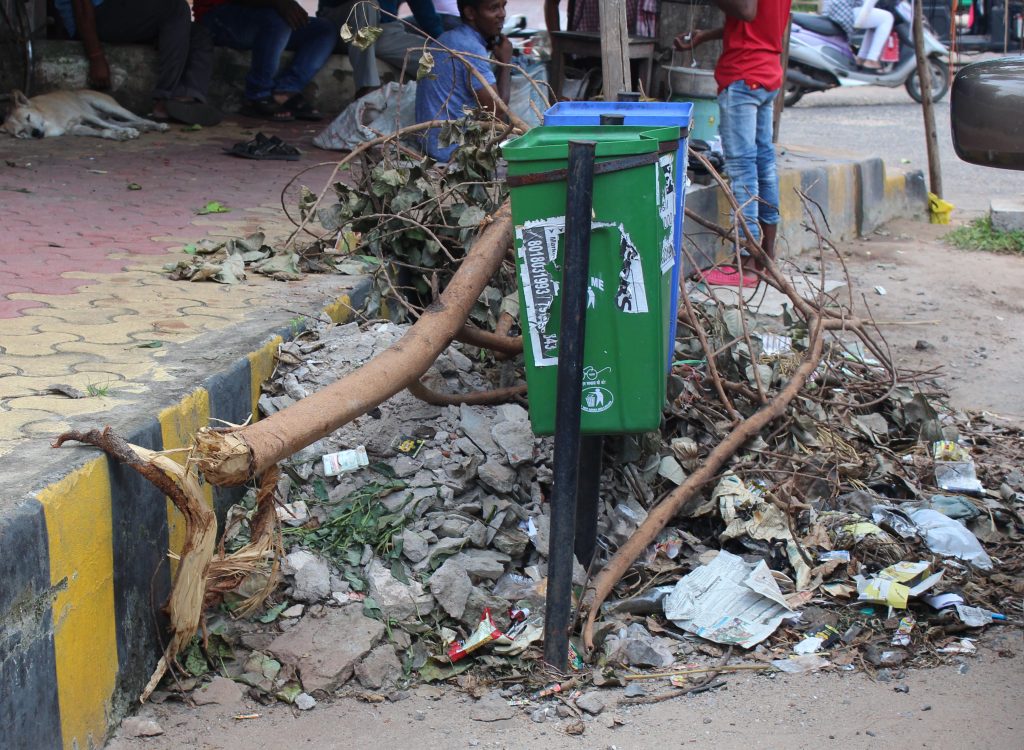Bhubaneswar: As the solid waste management is the key to safe and clean environment, the Bhubaneswar Municipal Corporation (BMC) had started the blue and green dustbin campaign to segregate the dry and wet waste and garbage. But it has not succeeded the way it should have because most of the bins are either damaged or people are not dropping the waste in the right way.
In 2016, the BMC had started installing colour-coded waste bins – green for biodegradable waste and blue for non-biodegradable waste. In many places, multiple dustbins can be seen but unfortunately they are not successful in doing the job of waste management. The civic body had put up 3,600 dustbins at 1,800 locations across the city initially and later installed some more in other places.
National Green Tribunal lawyer and environmental worker Sankar Prasad Pani said that dustbin use has not been successful. The awareness regarding the segregation of waste is necessary to reach more and more people which BMC can do with the help of different agencies. The door-to-door management of dry and wet waste by the cleaners is another option. He said the National Green Tribunal (NGT) has expressed displeasure over the state government’s failure to adhere to the Solid Waste Management Rules (2016) of the Central government.
The statutory body has directed Odisha Chief Secretary to submit detailed quarterly reports on the measures taken to manage solid waste in the state.
Urban planner Piyush Ranjan Rout said the dustbins were mostly placed for fancy purposes rather than waste management because the city doesn’t have a waste segregation system. People just use them as garbage bins without looking at segregation factor. As a result, when the waste is collected it gets mixed up. These garbage bins are not meant for major streets or neighborhoods where the quantity of waste is huge.
Sankar also said the initiative lacked incentives for customers if they returned the used stuff such as drink cans and brought their own eco-friendly shopping bags. The effort to ensure segregation of waste at source has been a dud as the civic body has failed in both maintaining the colour-coded dustbins and in creating awareness among the people.
Pramod Dabrase, an expert in solid waste management, said the impact on public health and environment due to lack of solid waste management systems are least understood. Solid waste is a problem not only in cities, but in rural areas too.
He said that the indiscriminate disposal of solid wastes has a significant impact on public health, environment and economy that can harm the overall quality of life as well as the environment. The problems which can occur due to excess solid wastes are chemical poisoning, neurological disorders, hormonal imbalance, eye and respiratory infections, skin cancer etc, he said.
Ranjan Panda, an environmentalist and a member of Water Initiatives, said that in the absence of a robust awareness drive, people couldn’t use the bins properly.
Besides installing the colour-coded bins at public places, the civic body has also decided to distribute such bins among households. The plan is to ask people to use the bins and segregate the waste at their level, following which the civic body will collect the segregated waste and dispose it off at the dump yard. The door-to-door waste segregation is nice way of waste
management.
BMC official said that cyclone Fani had damaged many of the dustbins. “We have plans to launch more and more awareness campaigns for the right use of dustbins.”
Arindam Ganguly, OP
